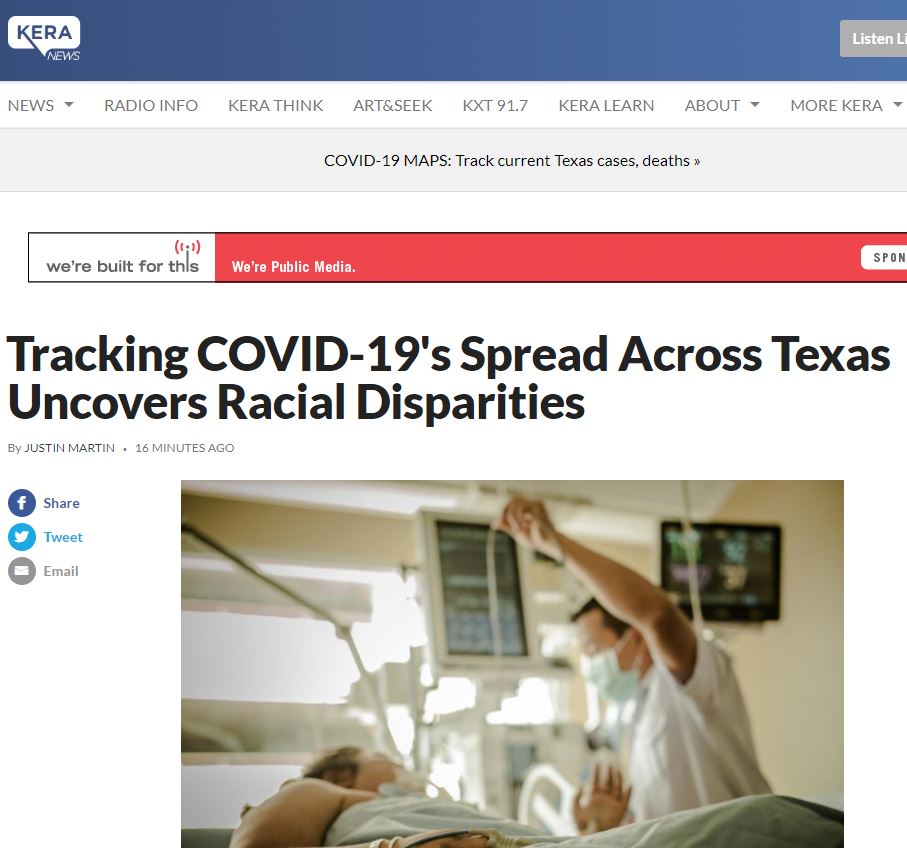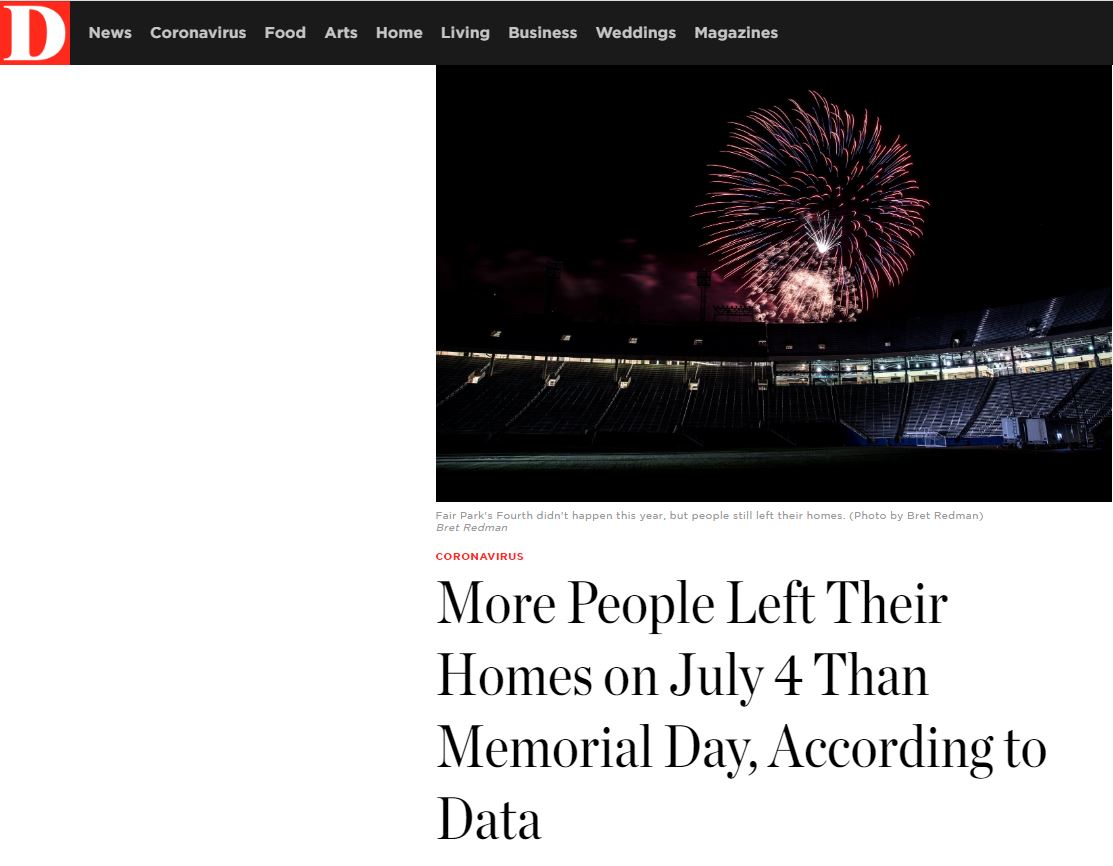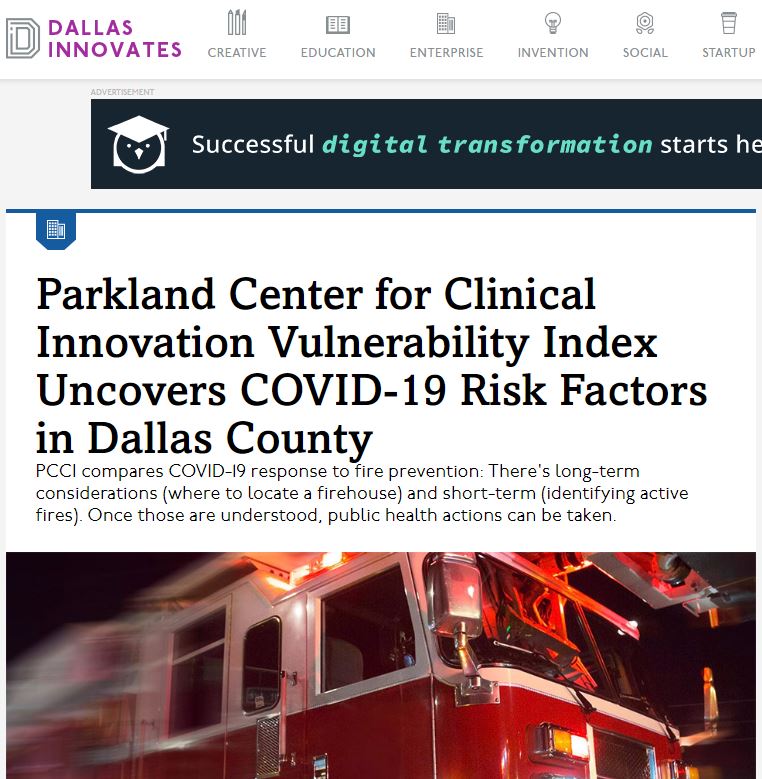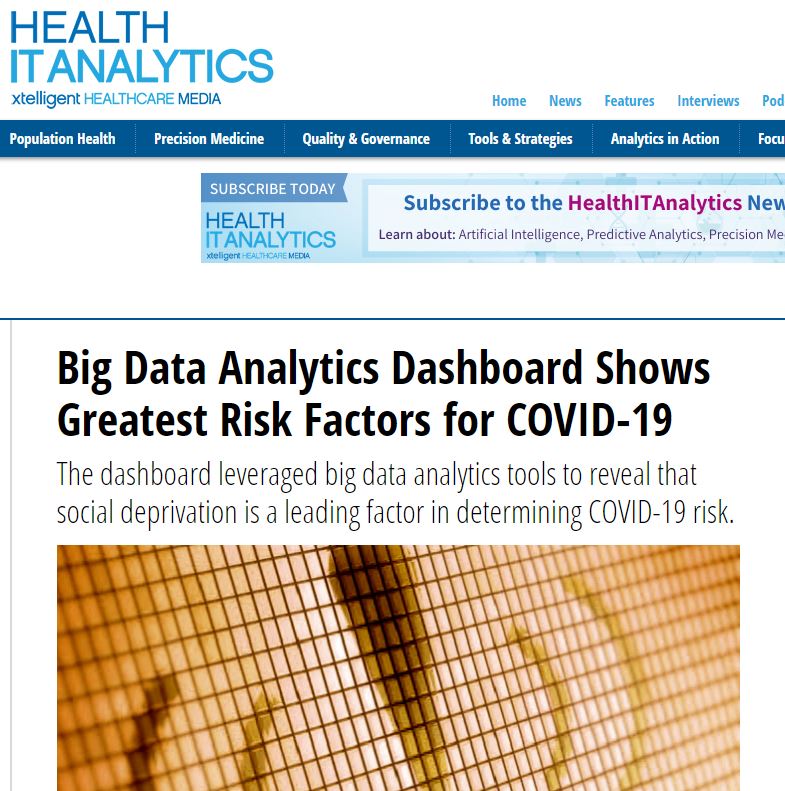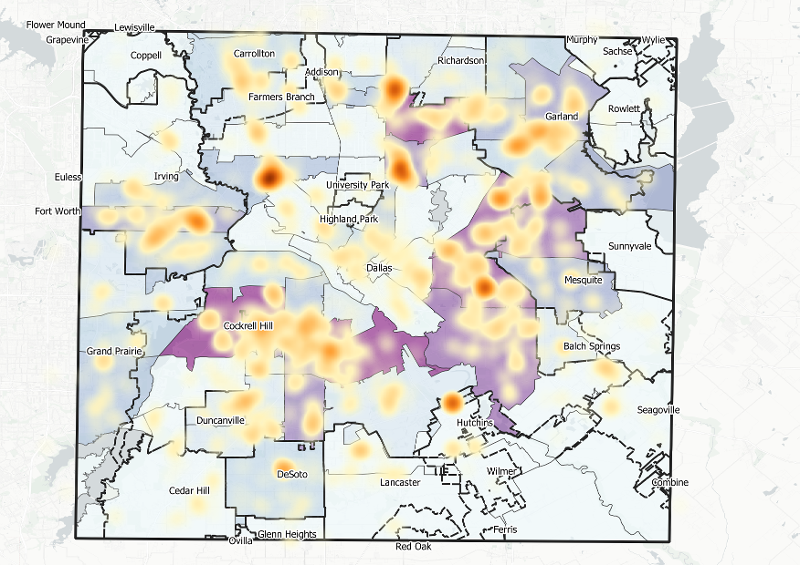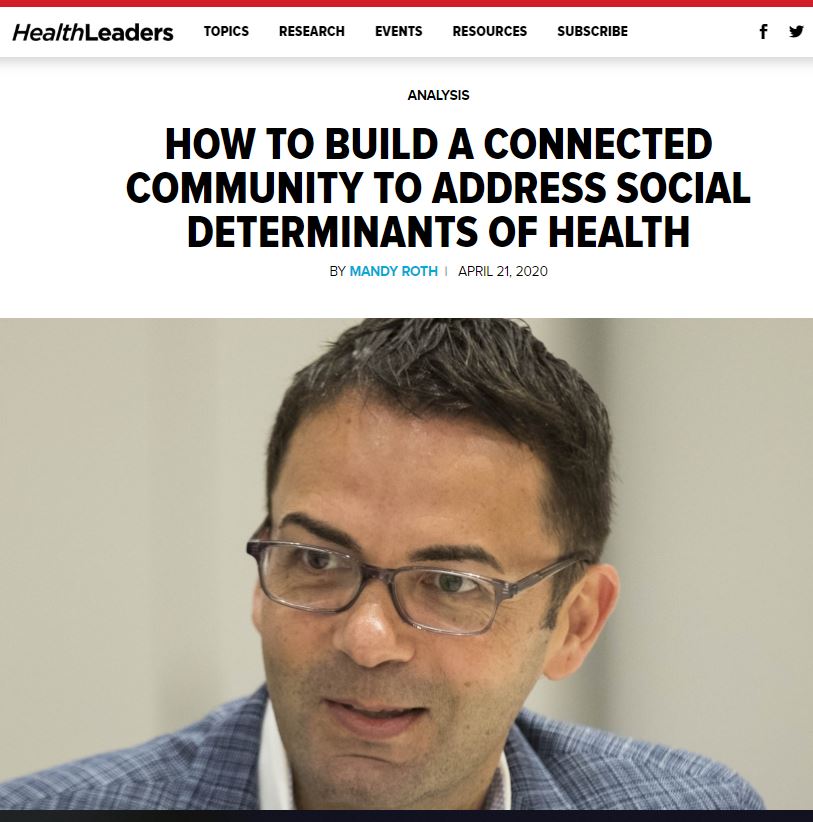In the news: D Magazine features PCCI’s data showing more people going out of their homes on July 4
In the news: Healthcare Innovation covers NIH Collaboratory presentation by PCCI’s Holt Oliver
In the news: Dallas Innovates – PCCI’s Vulnerability Index Uncovers COVID-19 Risk Factors in Dallas County
Dallas Innovates has written a feature on PCCI’s Vulnerability Index that uncovers areas of Dallas County that are most at-risk for COVID-19 infection. A collaboration of the Dallas Regional Chamber and D Magazine Partners, Dallas Innovates is an online news platform covering what’s new + next in Dallas – Fort Worth innovation. Please click on the image below to read the whole story:
In the news: D CEO – PCCI’s analysis maps at-risk populations, COVID-19 outbreaks
In the news: HealthIT Analytics – Big Data Dashboard Shows Greatest Risk Factors for COVID-19
The release of PCCI’s Vulnerability Index has been covered by the Xtelligent media outlet, Health IT Analytics. This outlet has covered PCCI’s NMDOH leadership extensively. HealthIT Analytics connects with subject-matter experts from the nation’s top providers to feature real use cases in data analytics that improve the health of individuals and populations and the cost of providing care.
Please click the image to read the full story:
PCCI’s Vulnerability Index shows social disparities as leading risk factor during COVID-19 outbreak
PCCI develops COVID-19 Vulnerability Index to identify the most at-risk in Dallas County
Dallas – Parkland Center for Clinical Innovation (PCCI), which improves healthcare for vulnerable populations using advanced data science and clinical experts, has developed and validated a multidimensional COVID-19 Vulnerability Index incorporating socioeconomic, clinical, mobility and demographic risk factors to accurately identify communities at high-risk for COVID-19 infection. The Vulnerability Index’s major finding shows that social deprivation is a leading factor in determining the risk for COVID-19 infection and the primary reason for racial/ethnic disparities in COVID-19 risk, more so than age, race or comorbidity rates.
The PCCI COVID-19 Vulnerability Index can be found on its COVID-19 Hub for Dallas County at: https://covid-analytics-pccinnovation.hub.arcgis.com/.
 PCCI’s Vulnerability Index determines communities at risk by examining comorbidity rates, including chronic illnesses such as hypertension, cancer, diabetes and heart disease; areas with large density of populations over the age of 65; increased social deprivation such as lack of access to food, medicine, employment and transportation; and mobility via modeling the rate at which individuals are able to observe stay-at-home and social distancing measures. Historical racial/ethnic and social disparities in health are also seen with COVID-19, with Hispanic and African American neighborhoods at highest risk.
PCCI’s Vulnerability Index determines communities at risk by examining comorbidity rates, including chronic illnesses such as hypertension, cancer, diabetes and heart disease; areas with large density of populations over the age of 65; increased social deprivation such as lack of access to food, medicine, employment and transportation; and mobility via modeling the rate at which individuals are able to observe stay-at-home and social distancing measures. Historical racial/ethnic and social disparities in health are also seen with COVID-19, with Hispanic and African American neighborhoods at highest risk.
“These kinds of precise data insights will help us understand communities and populations at greatest risk to COVID-19 and how to prioritize and tailor community interventions in order to proactively manage current and future outbreaks or other community-wide interventions,” said Steve Miff, PhD, President and CEO of PCCI.
Philip Huang, MD, Director of Dallas County Health and Human Services said, “From a community health perspective, these latest PCCI analytics continue to support our ongoing efforts to proactively identify hot-spots, rapidly deploy targeted testing that is accessible locally, inform and educate the community using culturally-sensitive approaches, and align other critical resources to support individuals and their families during these difficult times.”
The PCCI Vulnerability Index is multi-dimensional, incorporating stable, foundational components such as demographics, prevalence of comorbidities and social/economic resources. The Vulnerability Index dynamically monitors and models population’s ability to observe stay-at-home orders and near real-time COVID-19 incident rate.
“We are using analytics such as the PCCI Vulnerability Index to identify and prioritize our testing strategy, deployment of resources, and to facilitate transparency and collaboration across both public and private organizations that are crucial in these efforts,” said Kelvin Baggett, MD, City of Dallas COVID-19 Health and Healthcare Access Czar.
PCCI’s Vulnerability Index will be an essential tool as communities work to manage ongoing risks with COVID-19. Specific activities will include:
- Target and tailor neighborhood responses, such as pandemic response readiness incorporating focused partnerships with local organizations based on neighborhood-specific risk profiles
- Leverage partnerships for rapid deployment of testing, isolation or educational resources when rising risks occur
- Tailor interventions to address elements of social deprivation that lead to higher risk for COVID-19
- Provide culturally sensitive or culturally informed interventions targeting African American and Hispanic neighborhoods
Data Sources:
To build Vulnerability Index, PCCI relied on data from Parkland Health & Hospital System, Dallas County Health and Human Services Department, the Dallas-Fort Worth Hospital Council, U.S. Census and SafeGraph.
About Parkland Center for Clinical Innovation
Parkland Center for Clinical Innovation (PCCI) is an independent, not-for-profit, healthcare intelligence organization affiliated with Parkland Health & Hospital System. PCCI leverages clinical expertise, data science and Non Medical Drivers of Health to address the needs of vulnerable populations. We believe that data, done right, has the power to galvanize communities, inform leaders, and empower people.
###
‘Building Connected Communities of Care,’ An Essential Tool to Support Under-Served Communities During Times of Crisis
Dallas, Texas – Parkland Center for Clinical Innovation’s (PCCI) new book, “Building Connected Communities of Care: The Playbook for Streamlining Effective Coordination Between Medical and Community-Based Organizations,” is a guide that brings together communities to support our most vulnerable, a critical need that has been exposed during the COVID-19 pandemic that has significantly impacted under-served populations.
PCCI, which improves healthcare for vulnerable populations using advanced data science and clinical experts, published “Building Connected Communities of Care,” a playbook created by its authors Keith Kosel, PhD, and Steve Miff, PhD, that offers a step-by-step program for coordinating medical and community-based resources to change how, where and when healthcare is delivered.
“During a crisis-level event such as the COVID-19 pandemic, it is critical to mobilize our resources appropriately to help our under-served communities,”said Dr. Kosel. “Integrating our medical resources, community-based organizations and government groups has been viewed as desirable, but if the COVID-19 experience is telling us anything, having connected communities of care is essential in order to react to the needs across our communities, especially those most vulnerable.”
The path laid out in this book will help communities achieve better results before, during and after a crisis event, while keeping resources appropriately directed during normal times where everyday stresses on communities already tax limited reserves.
“The objective of the book is to move healthcare upstream by providing interventions that give individuals a health path that reduces their need for hospitalization,” said Dr. Miff, CEO of PCCI. “It is our hope that any organization and community can pick up this playbook and customize and deploy their own connected community of care to enable them to use their resources more efficiently while improving care and reducing costs.”
“Building Connected Communities of Care” is based on the experience of Dallas, Texas, which was one of the first metropolitan regions to develop at scale a comprehensive foundation for partnership between a community’s clinical and social sectors using web-based information exchange. In the five years since the initial launch, the authors with their teams and partners have been able to provide digital connection, communication, and coordination between healthcare providers and a wide array of community-based social service organizations.
PCCI’S “Building Connected Communities of Care” is available in electronic, hard- and softcover editions at HIMSS Publishing and Amazon, go HERE to get your copy today.
About Parkland Center for Clinical Innovation
Parkland Center for Clinical Innovation (PCCI) is an independent, not-for-profit, mission-driven organization with industry-leading expertise in the practical applications of advanced data science and Non Medical Drivers of Health. We strive to leapfrog the status quo by harnessing the transformative potential of data. Our unique capabilities allow us to provide innovative, actionable solutions that more effectively identify needs, prioritize services, empower providers and engage patients.
###
HealthLeaders: HOW TO BUILD A CONNECTED COMMUNITY TO ADDRESS Non Medical Drivers of Health
HealthLeaders, a highly respected and referenced media outlet targeting healthcare professionals and executives, has posted a feature on the book PCCI published in March, “Building Connected Communities of Care.” This article is posted online and will also be included in their print edition coming out in mid-May. Please click the image below to read the entire story:
https://www.healthleadersmedia.com/innovation/how-build-connected-community-address-social-determinants-health
In the News: The Best T-Shirt in Dallas Right Now
The owners of Good Citizen have designated PCCI a recipient of proceeds from a stay-safe T-shirt promotion. PCCI appreciates the support of Good Citizen and pledges that any proceeds received from this program will be used to support community-based programs PCCI partners with in Dallas. To learn all the details, please click on the image below:

